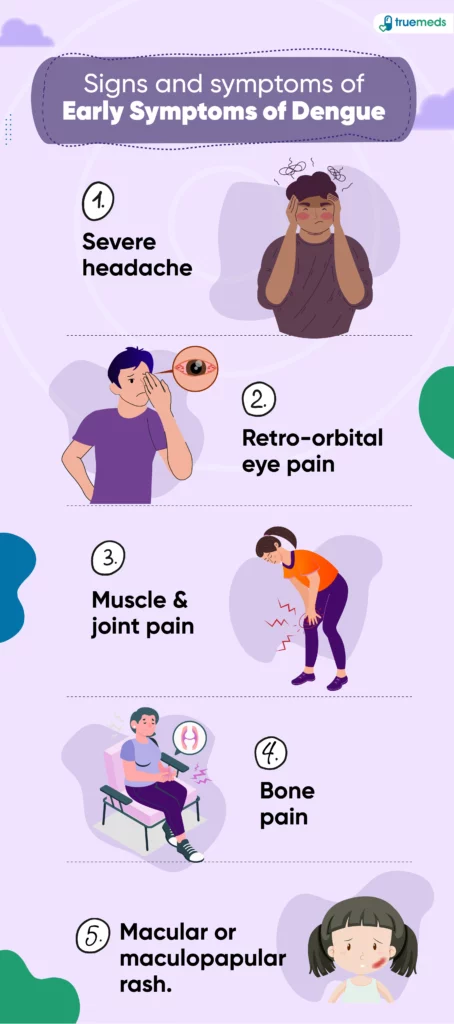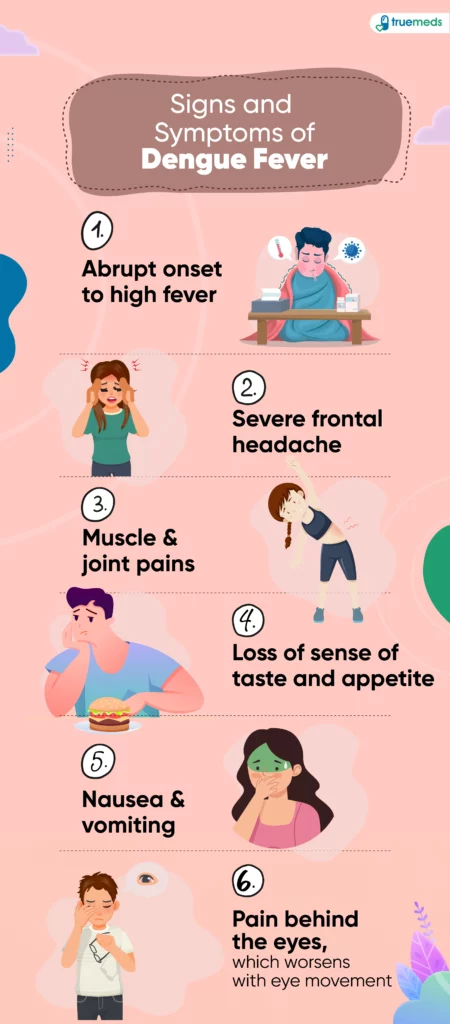Dengue manifests without symptoms most of the time, which makes it challenging to detect. When the symptoms appear, it’s crucial to identify and differentiate them as mild or severe. This will ensure the appropriate treatment is done accordingly. Mild symptoms of Dengue are often confused with other illnesses that cause fever, aches, and pain or as Dengue rash.
The Dengue situation in India, as per a report about the Dengue situation from the National Centre for Vector-borne Disease Control in 2023, had 94198 cases and 91 deaths.
On a global level, From 2023, more than 5 million cases and 5,000 deaths were reported in 80 countries; this is a spike in number of cases when compared to earlier times.
In general, up to 400 million people get infected with Dengue. Approximately 100 million people get sick from Dengue, and 40,000 die from severe Dengue.
There is no specific treatment for Dengue; only painkillers are used. Or there are many home remedies for Dengue. In severe cases, Dengue can be life-threatening.
The Dengue risk can be lowered by avoiding mosquito bites, especially during the day.
This article will explain the early signs of Dengue how it manifests in mild-severe conditions and children or adults.
What is Dengue?
Dengue is a viral infection caused by the Dengue virus transmitted to humans through the bite of infected mosquitoes. It is more common in tropical and subtropical climates in urban and semi-urban regions.
Causes of Dengue
The Dengue is caused by 1 of 4 different but related viruses. It spreads with the bite of the Aedes aegypti mosquito, primarily found in tropic and subtropical climates. These regions include
- South and Central America
- Southeast Asia
- Sub-saharan Africa
- The Caribbean( including Puerto Rico and the US Virgin Islands)
Types of Dengue: Its Early Signs & Symptoms
The early phase of Dengue typically begins after 5-7 days of mosquito bite. This is followed by three phases: Dengue Fever, Mild Dengue & Severe Dengue, The first or early phase being the febrile phase.
Early Symptoms of Dengue

- Fever- It typically lasts for 2-7 days, which can occur in two phases.
- Signs and symptoms include-
- Severe headache
- Retro-orbital eye pain
- Muscle & joint pain
- Bone pain
- Macular or maculopapular rash.
- Hemorrhagic Manifestations – It includes thing like- purpura, epistaxis, ecchymosis, petechia, haematuria, bleeding gums.
- Facial Erythema – Some patients exhibit facial erythema within 24-48 hours after onset.
1) Dengue Fever
Dengue, in its mild form, causes fever and rash and can last up to a week. Dengue fever begins with a sudden high fever up to 104 degrees Fahrenheit after 4-7 days after infection. A flat red rash all over the body may appear in 2-5 days after fever starts. A second rash, like measles, appears in the later stage of the disease. Infected people have increased skin sensitivity.
Signs and Symptoms of Dengue Fever

- Abrupt onset of high fever
- Severe frontal headache
- Muscle & joint pains
- Loss of sense of taste and appetite
- Nausea & vomiting
- Pain behind the eyes, which worsens with eye movement
2) Mild Dengue
Once the early signs of Dengue appear, symptoms will follow. As said earlier, the symptoms are not apparent in most cases. Whenever there are mild or no symptoms, it will get better in 1-2 weeks.
Symptoms of Mild Dengue

- High fever(104 degrees Fahrenheit)
- Severe headache
- Pain behind the eyes
- Muscle and joint pain
- Nausea
- Vomiting
- Swollen glands
- Dengue rash
3) Severe Dengue
When the symptoms of mild Dengue do not improve, it leads to severe Dengue. The symptoms appear only after fever reduction.
Symptoms of Severe Dengue

- Severe abdominal pain
- Persistent vomiting
- Rapid breathing
- Restlessness
- Fatigue
- Bleeding gums or nose
- Blood in vomit or stool
- Very thirsty
- Pale and cold skin
- Feeling weak
Severe Dengue is more common in individuals infected with Dengue for the second time. People with severe symptoms require emergency or hospital care. The effect of Dengue infection after recovery is weakness for several weeks.
Dengue may be of two kinds either symptomatic or asymptomatic. It is often asymptomatic; therefore, it’s a challenging scenario. The Dengue symptoms in children and adults are slightly different.
Dengue Symptoms in Children
The symptoms of Dengue in Children will last 2-7 days after the mosquito bite, and if it is mild-moderate Dengue then it will be cured in 1-2 weeks. The Dengue symptoms in a child are as follows;
- A sudden high fever
- Severe headache
- Pain behind the eyes
- Muscle and joint pains
- Nausea
- Vomiting
- Swollen glands
- Skin rash
Children suffering from Dengue may become more irritable, where sleep patterns and appetite may change. Dengue can look very similar to the chikungunya and malaria. It is very easily misdiagnosed as other diseases. The only way to be sure of Dengue is to get a laboratory test done.
Dengue Symptoms in Adults
The most common symptom of Dengue in adults is fever. It may associated with the below signs like;
- Nausea
- Vomiting
- Rash
- Pains and Aches – eyes pain, pain in the back of the eyes, muscle, joint, or bone pain.
Warning signs of Dengue in adults appear once after the fever is gone, i.e., after 24-48 hours. Visit the nearest doctor when you see these below symptoms of Dengue in adults:
- Belly pain or tenderness
- Vomits ( more than 3 in 24 hours)
- Bleeding from the nose or gums
- Feeling tired or restless or irritable.
Diagnosis of Dengue Infection
The doctors can diagnose the Dengue infection by a blood test. The blood test reveals the presence of a virus or the antibodies to it. The people who are getting the Dengue for the second time are at more risk of severe Dengue than the people who got it for the first time.
Treatment of Dengue Infection
Most cases of Dengue can be treated at home with pain medicine. While there is no specific treatment for Dengue, using a home remedy for dengue can help provide pain relief.
Paracetamol is used to control the pain. NSAIDs, non-steroidal anti-inflammatory medicines like ibuprofen, and aspirin should be avoided as they tend to increase bleeding.
For people with severe Dengue, emergency care or hospitalization is required.
Precautions and Control for Dengue
The mosquito bite is responsible for Dengue. These mosquitos are active during the daytime. Follow the below precautions to protect yourself from the mosquitos bite to control Dengue;
- Wear clothes as long as they cover the body.
- Use mosquito nets when sleeping, especially during the day.
- Use insect repellants
- Mosquito repellants which contain DEET and picaridin
- Coils and vaporisers
- Use of window screens
In case, you get infected with Dengue, then you can take these precautions;
- Rest
- Drink plenty of fluids.
- Use acetaminophen for the pain relief.
- Avoid non-steroidal anti-inflammatory drugs like ibuprofen and aspirin.
- Watch out for any severe symptoms.
Dengue vaccine – “Dengvaxia” is recommended for those infected with the Dengue once in some countries.
Frequently Asked Questions (FAQs)
No, Dengue is not a contagious disease. It is caused by a virus and cannot be passed from one person to another. It spreads through the mosquito bite.
Foods rich in lean protein and low carbohydrate are considered good foods during Dengue infection. A diet rich in vitamin C(oranges, papaya), vitamin K(sprouts, broccoli), vitamin D( salmon fish, cod liver oil), vitamin E( wheat germ oil, almonds), iron(beans and cereals), and zinc(beans and nuts) is recommended.
Severe cases of Dengue can cause death. Pregnant women and young children are at higher risk of death due to Dengue. 1 in 20 people have the risk of developing severe Dengue.
Yes, a person can get Dengue twice, as there are four different variants of the Dengue virus. When infected with one variant, only specific antibodies of that particular variant are developed inside the body. When the person is affected by the other three variants, the antibodies produced earlier will not have any effect, and the person will be at high risk of severe Dengue.
References
- Symptoms and treatment. (2022, August 8). Centers for Disease Control and Prevention. https://www.cdc.gov/Dengue/symptoms/index.html
- Dengue and severe Dengue. (2023, March 17). World Health Organization (WHO). https://www.who.int/news-room/fact-sheets/detail/Dengue-and-severe-Dengue
- Ministry of Health & Family Welfare-Government of India. (n.d.). Signs & symptoms of Dengue fever :: National center for vector borne diseases control (NCVBDC). Home :: National Center for Vector Borne Diseases Control (NCVBDC). https://ncvbdc.mohfw.gov.in/index4.php?lang=1&level=0&linkid=436&lid=3711
- Clinical presentation. (2023, April 13). Centers for Disease Control and Prevention. https://www.cdc.gov/Dengue/healthcare-providers/clinical-presentation.html
- Dengue fever – StatPearls – NCBI bookshelf. (2022, November 14). National Center for Biotechnology Information. https://www.ncbi.nlm.nih.gov/books/NBK430732/

Leave a Reply